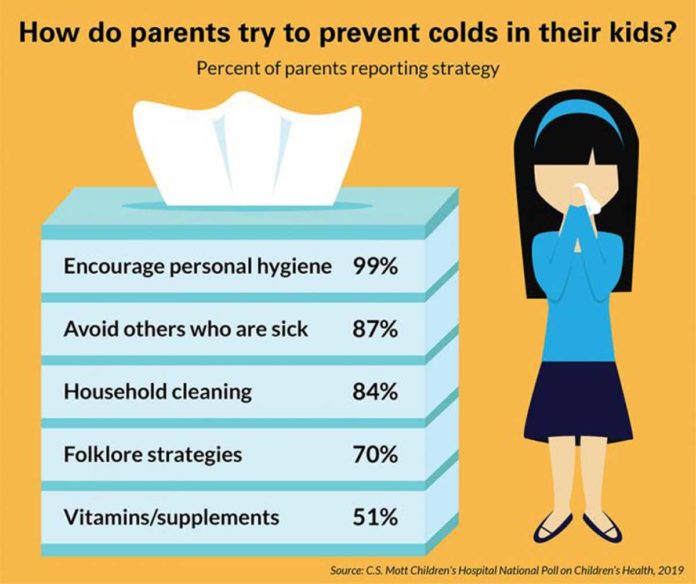More than half of the parents believe that Vitamin C keeps germs away from their kids. They even don’t allow kids to go outside with wet hair.
In the view of parents, such type of help their kids avoid catching or preventing a cold. According to the C.S. Mott Children’s Hospital National Poll on Children’s Health at the University of Michigan, more than half of parents have tried these methods with their kids.
The uplifting news: Almost all parents (99 percent) express their way to deal with cold prevention includes strong personal cleanliness, which science indicates avoids spreading colds. These methods incorporate urging kids to wash their hands every frequently, teaching them not to put their hands close to their mouth or nose and demoralizing kids from sharing utensils or beverages to other people.
Still, 51 percent of parents gave their child an over-the-counter vitamin or supplement to prevent colds, even without evidence that they work. Seventy-one percent of parents also say they try to protect their child from catching a cold by following non-evidence-based “folklore” advice, such as preventing children from going outside with wet hair or encouraging them to spend more time indoors.
Gary Freed, M.D., M.P.H., co-director of the poll and a pediatrician at Mott said, “The positive news is that the majority of parents do follow evidence-based recommendations to avoid catching or spreading the common cold and other illnesses.”
“However, many parents are also using supplements and vitamins not proven to be effective in preventing colds and that are not regulated by the U.S. Food and Drug Administration. These are products that may be heavily advertised and commonly used but none have been independently shown to have any definitive effect on cold prevention.”
There is no evidence that giving a child Vitamin C, multivitamins or other products advertised to boost the immune system is effective in preventing the common cold. Freed notes that the effectiveness of supplements and vitamins do not need to be proven in order for them to be sold.
Freed said, “The folklore strategies have likely been passed down from generation to generation and started before people knew that germs were actually the cause of illnesses like colds.”
On the splendid side, considerably more parents utilize cold prevention techniques that are upheld by science. Notwithstanding helping children practice good cleanliness propensities, 87 percent of guardians fend off kids from individuals who are already sick. Sixty-four percent of guardians detailed that they ask relatives who have colds not to embrace or kiss their child, and 60 percent would skip a playdate or movement if other kids were sick. Some parents (31 percent) avoid play areas altogether amid the cold season.
Eighty-four percent of parents also incorporated sanitizing their child’s environment as a strategy for preventing colds, such as frequent washing of household surfaces and cleaning toys.
On average, school-age children experience three to six colds per year, with some lasting as long as two weeks.
Freed said, “When children are sick with a cold, it affects the whole family. Colds can lead to a lack of sleep, being uncomfortable and missing school and other obligations. All parents want to keep families as healthy as possible.”
“But, It’s important for parents to understand which cold prevention strategies are evidence-based. While some methods are very effective in preventing children from catching a cold, others have not been shown to actually make any difference.”
